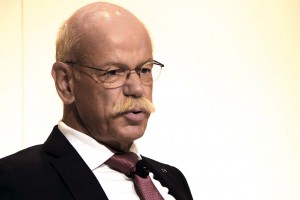
Daimler's Dieter Zetsche is one of many auto executives who were in favor of the now stalled trans Atlantic free trade partnership.
Global automakers appear to have suffered a political setback as discussion on a sweeping trade agreement between the United States and Europe appear to have stalled.
Sigmar Gabriel, German vice chancellor, said during an appearance in Berlin that talks on a trans Atlantic free-trade zone have run aground amid the rising political anxiety over trade on both sides of the Atlantic.
In the U.S. both Hillary Clinton, the Democratic Presidential candidate, and Donald Trump, her Republican rival for the Presidency, have cast doubts on new trade agreement. Trump, in fact, has made the anti-free trade rhetoric central to his campaign. In Europe, the British vote to exit the European Union has served to exacerbate the political tension surrounding trade issues.
The trans-Atlantic talks also have become a target of trade unions and environmental groups in Germany, who consider the talks a giveaway to corporate interest bent on imposing American and British-style capitalism with its indifference to labor right and environmental issues on the European continent. talks began in 2013. Dieter Zetsche, Daimler AG chief executive, said the trans-Atlantic talks held they key to harmonizing auto safety regulations on both sides of the Atlantic.
(Clinton or Trump: Change is coming to the auto industry. For more, Click Here.)
A report from the Center for Automotive Research entitled “Potential Cost Savings and Additional Benefits of Convergence of Safety Regulations between the United States and the European Union,” estimated $2.3 billion in savings could be realized if the Transatlantic Trade and Investment Partnership (TTIP) includes full U.S.-EU auto safety regulatory convergence, but on a global basis, the extra cost/saving rises to as much as $4.2 billion annually.
Meeting two different sets of standards that for all practical purposes achieve the same high level of auto safety performance and outcomes, poses an annual cost far exceeding the $1.6 billion in combined annual tariffs related to U.S.-EU motor vehicle trade, according to the study, which was published in July.
The study also said consumers would also benefit from regulatory convergence due to increased savings and better product choice, as automakers could increase vehicle offerings.
(Click Here for details about the impact virtual keys will have on car sharing programs.)
The proposed trans-Atlantic deal isn’t the only trade deal up for debate this election season. Both of the front runners, Clinton and Trump, have pledged to rework the North American Free Trade Agreement. Trump claims he’ll charge tariffs of 35% of vehicles built in Mexico and shipped to the U.S.
The sticking point for both candidates would be getting such changes through Congress. In terms of losing jobs and investment, trade data also show that as investment in vehicle production in Mexico has grown in recent years, so has the value of the necessary component exports from the U.S. to Mexico.
“NAFTA has also allowed carmakers to increase their chances of profitability by moving production of lower margin passenger cars, which are currently not selling as well in North America, to Mexico, while locating their higher margin trucks, SUVs and performance cars in the U.S.,” a recent report from BMI Research noted.
(New Trans-Pacific trade deal faces challenge from U.S. auto industry. For more, Click Here.)
Additionally, the duo has come out against the proposed Trans Pacific Partnership agreement as well. However, the TPP is the one of the key items on President Barack Obama’s agenda during his final term in office and enjoys rare support across the political parties as both Democrats and Republicans have spoken out in favor of the proposed agreement, which still needs to be finalized.

The problem with these agreements is that the public is not privy to the details. These might be the best trade deals EVER, but we’ll probably never know due to all the secrecy.
This is a bad time for secrets. Between the wikileaks Clinton email blowouts, Snowden’s revelations, shenanigans at the IRS, and the continued slow-walk of information from the State Department, the simple fact is: We can’t trust our own government to negotiate in good faith.
Sunshine is the best disinfectant, and right now, we need more, not less of it.